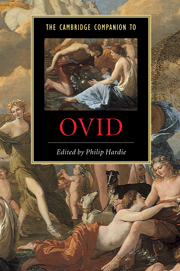2 - Ovid and early imperial literature
from Part 1 - Contexts and history
Published online by Cambridge University Press: 28 May 2006
Summary
'He was writing at a major point of change in Roman literature, and was himself no small part of that change. Some of his work … can be read as putting the finishing touches to earlier types of poetry; but the major part of it looks unmistakably to the future.' Gordon Williams' statement is typical of a literary history that places Ovid at a point of transition between two periods of Latin literature, frequently conceived in evaluative terms as a transition from a 'Golden', Augustan, to a 'Silver', Imperial, age, or from a classical to a post-classical period that is sometimes labelled 'mannerist' or 'baroque', on the analogy of the periodization of Renaissance art. These aesthetic labels have political and moral implications: 'Augustanism' is seen as the spirit of a golden age of political and cultural stability and harmony, followed by a descent into an oppressive autocracy, under which literary activity becomes detached from a constructive symbiosis with political and cultural reality, a literature either of escapism or of protest.
Ovid’s dates conveniently fit this scheme: he was born in 43 bc, the year after the assassination of Julius Caesar, and his first works appeared in the bright days of the early Augustan principate, a celebration, albeit on Ovid’s own terms, of the prosperity and sophistication that flourished in the pax Augusta. Ovid lived on into the reign of Tiberius, detached now physically by exile from the centres of political and cultural life. The change from Golden to Silver is often located not at the succession from Augustus to Tiberius, but within the reign of Augustus himself, as he mutates from approachable princeps into suspicious autocrat.
- Type
- Chapter
- Information
- The Cambridge Companion to Ovid , pp. 34 - 45Publisher: Cambridge University PressPrint publication year: 2002
- 8
- Cited by

